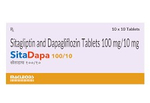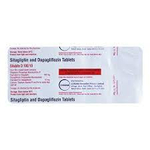Dapanova S 10mg/100mg Tablet 10s
Dapanova S 10mg/100mg Tablet 10s is a medication that combines Dapagliflozin and Sitagliptin and is prescribed to manage blood sugar levels in adults diagnosed with Type 2 Diabetes. Dapagliflozin prevents the kidneys from reabsorbing glucose, leading to increased sugar elimination through urine. Sitagliptin works by blocking an enzyme that regulates hormones boosting insulin and lowering glucagon, thereby helping to control blood sugar levels.
Dapagliflozin reduces blood sugar by preventing the kidneys from reabsorbing glucose, allowing more sugar to be eliminated in urine. Sitagliptin blocks an enzyme that breaks down hormones responsible for regulating blood sugar levels.
Follow your doctor's prescribed dose and duration. It can be taken with or without food, but consistency in the daily intake time is recommended for better results.
Possible side effects include vaginal yeast infections, inflammation of the throat and nasal passages (nasopharyngitis), and urinary tract infections.
It may increase urine production, potentially causing dehydration. Ensure adequate fluid intake, particularly during situations that may lead to fluid loss like diarrhea, vomiting, or excessive sweating Individuals with liver impairment might require dose adjustments.
If a dose is missed, take it when remembered. However, if the next dose is approaching, skip the missed dose. Avoid doubling the dose. Consult your doctor for guidance on managing missed doses effectively.
Always adhere to your doctor's advice and promptly report any concerning symptoms or side effects while taking this medication.
Similar Medicines
Disclaimer : This information is not a substitute for medical advice. Consult your healthcare provider before making any changes to your treatment . Do not ignore or delay professional medical advice based on anything you have seen or read on Medwiki.
Dapanova S 10mg/100mg Tablet 10s
Prescription Required
Packaging :
strip of 10 tablets
Manufacturer :
Medley PharmaceuticalsComposition :
Dapagliflozin (10mg) + Sitagliptin (100mg)


















.svg)
